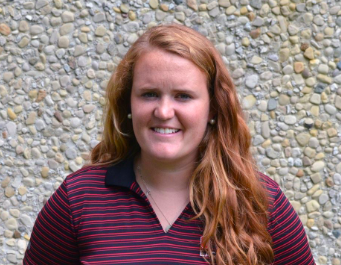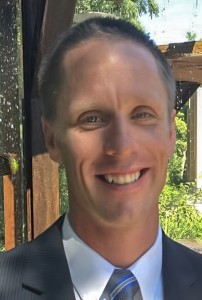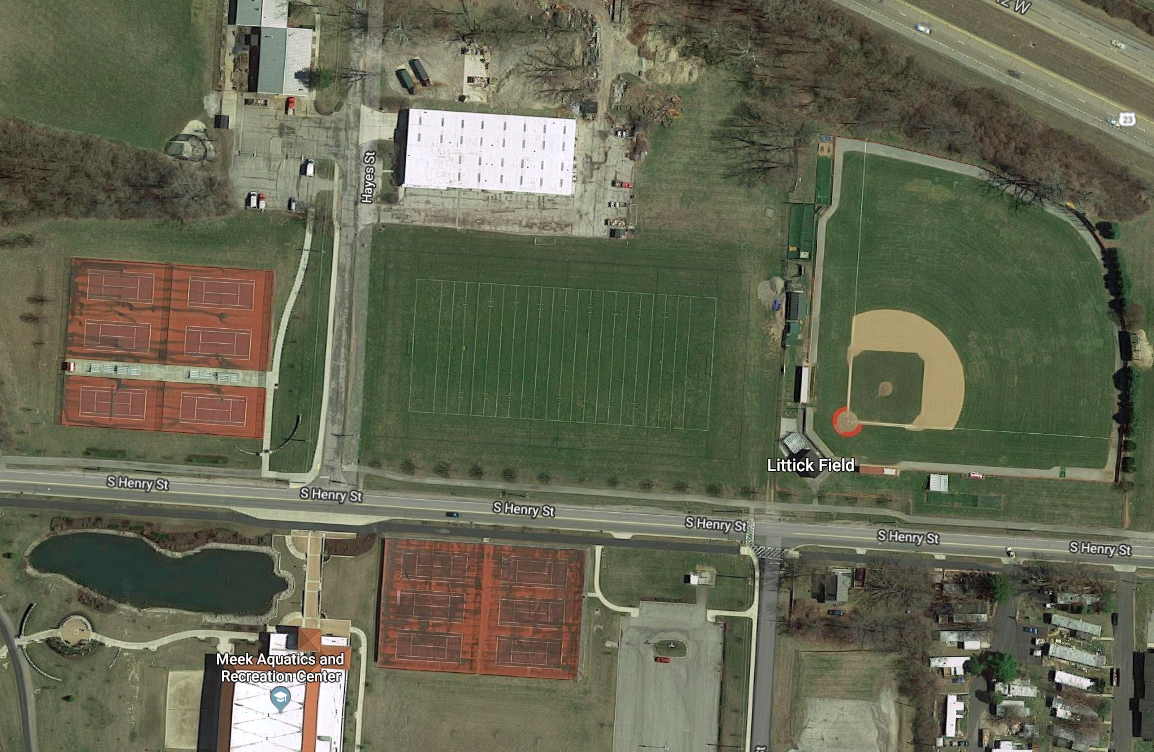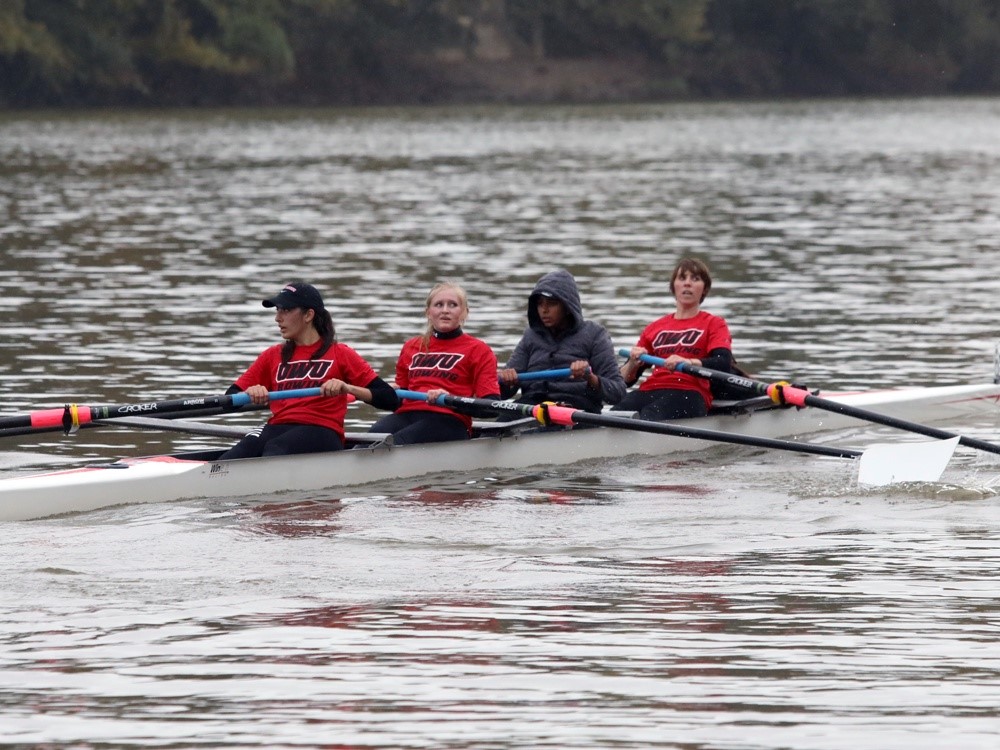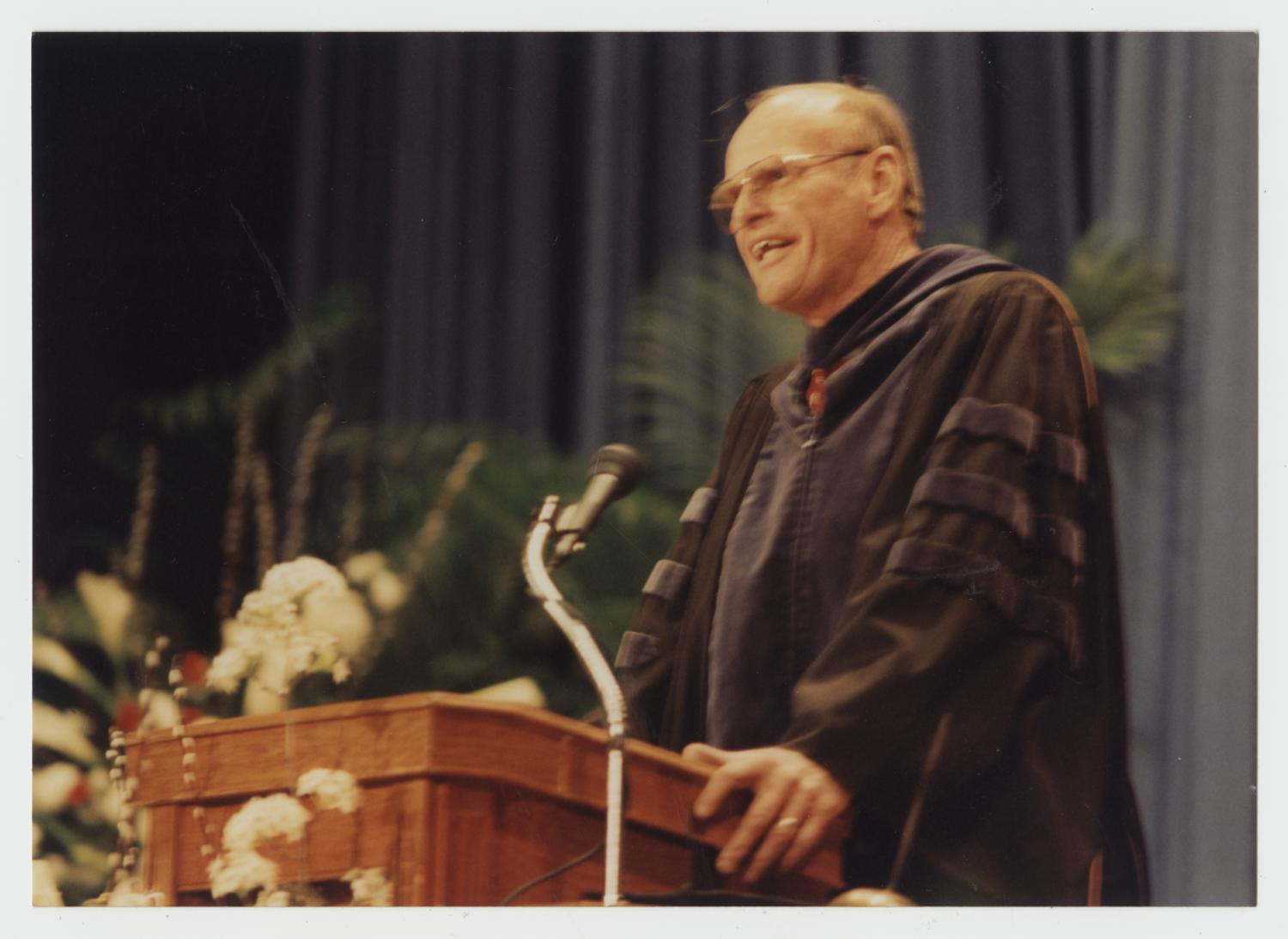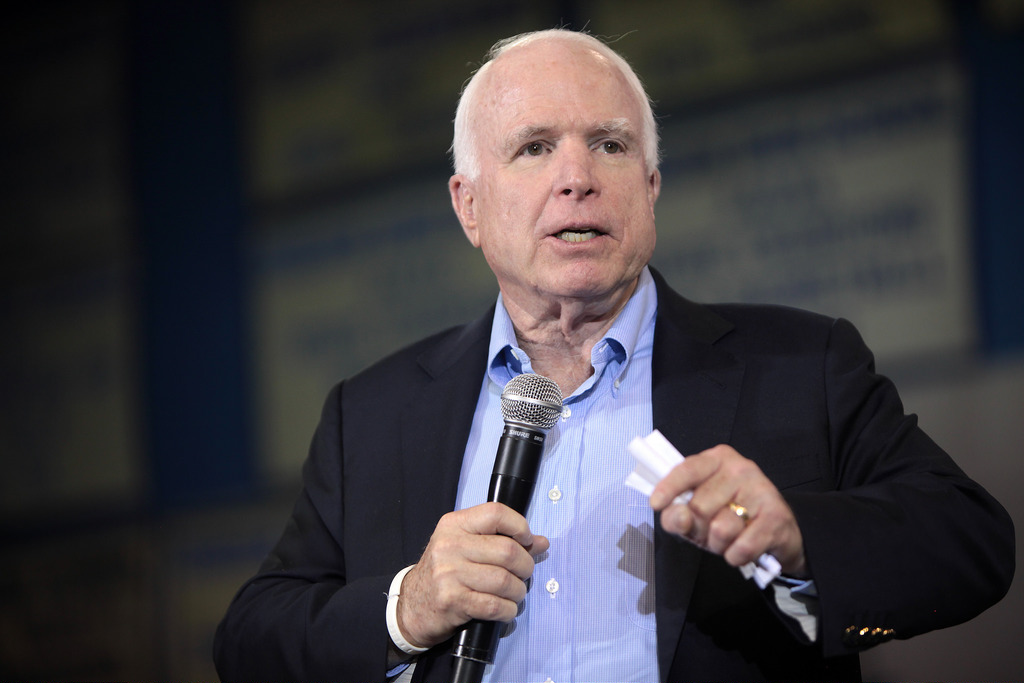By Kienan O’Doherty, Editor-In-Chief
As the world watched an emotion-filled service yesterday for late U.S. Sen. John McCain (R-Ariz.), Ohio Wesleyan University (OWU) remembers the passionate politician.
Sen. McCain came to OWU twice, both in 1997 and again in 2010, to serve as the keynote speaker for commencement addresses.
McCain died on Aug. 25 after deciding not to continue medical treatment for glioblastoma, a form of brain tumor.
McCain will be remembered for his 22 years in the U.S. Navy and 36 years in both the U.S. House and Senate. McCain also made headlines as he ran for president twice.
His memorial service included two former presidents, Barack Obama and George W. Bush, as speakers. Two men who ideally conflicted with McCain’s political views, but had an ultimate of respect for the Arizona Republican.
“So much of our politics, our public life, our public discourse, can seem small and mean and petty, trafficking in bombast and insult, in phony controversies and manufactured outrage,” Obama said in an New York Times article. “It’s a politics that pretends to be brave, but in fact is born of fear. John called us to be bigger than that. He called us to be better than that.”
Many people watched as Obama and McCain went toe to toe in the 2008 presidential election, but it was McCain’s graciousness toward his opponent that wowed the country, defending Obama on multiple occasions.
That tone of graciousness and positivity carried over during his visits to OWU, encouraging students during the 2010 address to appreciate freedom and to make a positive difference in the world.
Attached below is the transcript of his 2010 commencement address, as OWU and the world remember Sen. John McCain:
U.S. Senator John McCain
May 9, 2010
“Thank you. It’s an honor to be here, to join in the chorus of congratulations to the Ohio Wesleyan Class of 2010, and to share your pride and celebration. This is a day to bask in praise. You’ve earned it. You have succeeded in a demanding course of instruction from a fine university. Life seems full of promise. Such is always the case when a passage of life is marked by significant accomplishment. Today, it must surely seem as if the world attends you.
But spare a moment for those who have truly attended you so well for so long, and whose pride in your accomplishments is even greater than your own – your parents. When the world was looking elsewhere, your parents’ attention was one of life’s certainties. And if tomorrow the world seems a little indifferent as it awaits new achievements from you, your families will still be your most unstinting source of encouragement, counsel and often—since the world can be a little stingy at first—financial support.
So, as I commend the Class of 2010, I offer equal praise to your parents for the sacrifices they made for you, for their confidence in you and their love. More than any other influence in your lives, they have helped make you the success you are today and might become tomorrow.
I thought I would show my gratitude for the privilege of addressing you by keeping my remarks brief. I suspect that some of you might have other plans for the day that you would prefer to commence sooner rather than later, and I will not to detain you too long.
It’s difficult for commencement speakers to avoid resorting to clichés on these occasions. Given the great number of commencement addresses that are delivered every year by men and women of greater distinction, insights and eloquence than I possess, originality is an elusive quality.
One cliché that works its way into hundreds of addresses before graduating classes from junior high schools to universities is the salutation: “leaders of tomorrow.” Like most clichés, it represents an obvious truth. You and your generational cohort will be responsible for the future course of our civilization, and much of the course of human events in your time. But will you, with all the confidence and vitality you possess today, assume the obligations of professional, community, national or world leaders?
Many of you have already given your hearts and talents to causes greater than yourselves. I know it is a point of pride for this university and for many of you individually that Ohio Wesleyan received a Presidential Award for Excellence in General Community Service, one of just three schools to be so recognized. It’s an impressive distinction, and an encouraging one for those who hope your generation’s contributions to the progress of humanity will exceed the contributions of previous generations, and your leadership of causes and communities, our country and the world will surpass the achievements and correct the deficiencies of my generation’s leadership.
When you reach my age, experience with failure and a humbler appreciation of your achievements is as difficult to avoid as hardened arteries. When you’re young, or when I was young, anyway, it seems natural to doubt time’s great haste. But eventually most people come to understand how brief a moment a life is. That discovery does not, however, have to fill you with dread. You learn you can fill the moment with purpose and experiences that will make your life greater than the sum of its days. You learn to acknowledge your failings and to recognize opportunities for redemption.
No one expects you at your age to know precisely how you will lead accomplished lives or give your talents to the worthy causes of your time. You have time before these choices and challenges confront you. It’s been my experience that they reveal themselves over time to everyone. They are seldom choices that arrive just once, are resolved at one time, and, thus, permanently fix the course of your life. Many of the most important choices you will face emerge slowly, sometimes obscurely. Often, they are choices you must make again and again.
Once in a great while a person is confronted with a choice, the implications of which are so profound that its resolution affects your life forever. But that happens rarely and to relatively few people. For most people, life is long enough and varied enough to overcome occasional mistakes and failures.
You might think that I’m now going to advise you not to be afraid to fail. I’m not. Be afraid. Speaking from considerable experience, failing stinks. Just don’t be undone by it. Failure is no more a permanent condition than is success. “Defeat is never fatal,” Winston Churchill observed. “Victory is never final. It’s courage that counts.”
For twenty years a woman of astonishing courage and grace, Ang San Suu Kyi, has voluntarily endured imprisonment, threats to her health and life, the loss of loved ones, and all manner of cruelty at the hands of tyrants who resist her every effort to liberate her country from the iniquity of their rule. And the millions of Burmese people who love her, and who lawfully elected her their leader, have risen time and again in peaceful opposition to the regime, and to claim their natural rights to life, liberty and the pursuit of happiness. They have been imprisoned, tortured and murdered. When it isn’t looking the other way, the civilized world has often given them little more than rhetorical support, and the imposition of inadequate and porous sanctions against the regime that oppresses them.
When Ang San Suu Kyi’s husband was dying of cancer, the Burmese junta refused him permission to travel to Burma to bid his wife a last good-bye. Instead, they told Suu Kyi she could leave the country to visit him. But she knew that were she to leave, she would never be allowed back, and the inspiration she provides by sharing the struggle and suffering of her people would be lost to them. So she stayed under arrest, deprived of contact with her people and the world, and suffered her heartbreak alone.
But she and her people persist in their righteous cause. No defeat has undone them. No defeat ever will. The tyrants who try to silence and terrorize and destroy them will not outlive the moral courage that resists them. I have always believed, no matter how long it takes, how many setbacks are suffered, how resilient the forces of injustice, the righteous will prevail. I believe that for the people of Burma and Iran and Sudan and anywhere where darkness prevails for a time and inflicts its terrible miseries on the innocent, before the light of human conscience extinguishes it forever. We won’t all live to see it, but I cannot accept that the day won’t come eventually, when a blessed generation will see the triumph of good over evil in the last, dark corners of the world.
I have seen a lot of things in my life—a lot of things, like the fall of the Berlin Wall and the end of Cold War that I doubted I would ever witness in my lifetime. Though I see a lot of gathering storms on our horizon, I remain optimistic about the promise of our world, and the day of reckoning that will eventually come for those who sought worldly glory by denying the inherent dignity of others. And much of that optimism is based on my faith in your generation’s character.
I have faith that you understand that assaults on the dignity of others are assaults on the dignity of all humanity. You will not look upon tyranny and injustice in faraway places as the inevitable tragedy of mankind’s fallen nature. You will see them as a call to action – a summons to devote your time and talents to a just cause that is greater than yourself, the cause of human rights and dignity. Make this your legacy, and 20 years from now, maybe longer, you will be able to know that you made history, and made our country and world better. Not perfect, but better.
I believe American leadership in opposition to human rights abuses is the truest expression of our national character. The United States, since its founding, has embraced a set of moral duties, among which, I believe, is the obligation to respect the God-given dignity of every human being, and to experience assaults on anyone’s dignity as an assault on our own conscience.
It is surely right to say, first and foremost, the United States has an obligation to set a moral example in the world, and we failed that duty when we used torture to interrogate captured terrorists. That moral failure has made it harder for us to encourage other nations to respect the dignity of their citizens or to rally world support for the cause of the oppressed. But it hasn’t relieved us of the responsibility.
No, we are not a perfect nation. We did not act on reports of the Holocaust. We ignored the slaughter in Rwanda until it was too late. We have not made enough of an effort to stop the atrocities in Sudan and Burma and elsewhere. For too long, we refused to respect the full civil rights and dignity of Americans whose skin color was a shade darker than others. We mistreated enemies in our custody. But with each failure, our conscience is stung, and we resolve to do better. Each time, we say, never again, and fall short of that vow again. But whatever our flaws, whatever dangers we face, however sharp our debates, we must remain a country with a conscience. And we must feel ashamed when we ignore its demands.
All Americans share in the obligation to stand with those who are denied the rights we too often take for granted here. Even if you are never elected to any office or never meet a foreign policy professional, a responsibility remains. If the defense of human rights abroad is a concern of the American people, it will remain the concern of our elected officials. And if it is a concern of our government, the world will take notice.
It is your responsibility, your good fortune, to be expected to do better than your predecessors have done to advance our ideals; to live in your own time the authentic character of a country that was founded not to preserve tribal or class distinctions, but to defend human dignity. I envy your opportunities, and I regret the occasions when I failed to make the most of mine.
Twenty years, ago, I watched on television as the Berlin Wall came down, and it called to mind a quote from William Faulkner. “I decline to accept the end of man,” Faulkner said in his Nobel lecture. “I believe that man will not merely endure; he will prevail. He is immortal, not because he alone among creatures has an inexhaustible voice, but because he has a soul, a spirit capable of compassion and sacrifice and endurance.”
That faith has cost many lives, but liberated many more. It is the faith that tears down walls and builds bridges between peoples. It is the faith that made our nation the hope of mankind. And it is the faith we now rely on you to strengthen and advance. Take good care with it.
Not all of us will bear arms for our country. Few of us will ever rush into burning buildings to save the lives of strangers. Not many will devote their lives entirely to the well-being of others. But we do have an obligation to be worthy of our ideals, and the sacrifices made on their behalf. We have to love our freedom not just for the autonomy it guarantees us, but for the goodness it makes possible. We must love freedom for the right reasons, and on occasion our love will need courage to survive.
We are all afraid of something, whether it’s failure, or dispossession, or mortality, and the sacrifice of time that becomes so precious to us. But we should not let the sensation of fear convince us we are too weak to have courage. Fear is the opportunity for courage, not proof of cowardice. No one is born a coward. We were meant to love. And we were meant to have the courage for it.
Congratulations, again. Thank you for inviting me and for the privilege of addressing you, to whom history, and the dreams of mankind, will soon be entrusted.”
